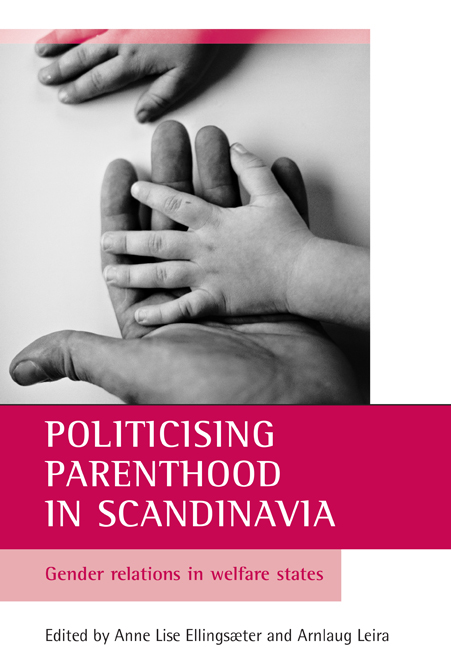Book contents
- Frontmatter
- Contents
- List of boxes, figures and tables
- Acknowledgements
- List of contributors
- one Introduction: politicising parenthood in Scandinavia
- Part One Politicising parenthood – legacies and challenges
- Part Two Gender equality and parental choice in welfare state redesign
- Part Three Work, family and the welfare state: redefining family models
- Index
one - Introduction: politicising parenthood in Scandinavia
Published online by Cambridge University Press: 15 January 2022
- Frontmatter
- Contents
- List of boxes, figures and tables
- Acknowledgements
- List of contributors
- one Introduction: politicising parenthood in Scandinavia
- Part One Politicising parenthood – legacies and challenges
- Part Two Gender equality and parental choice in welfare state redesign
- Part Three Work, family and the welfare state: redefining family models
- Index
Summary
During an historically short time span, family forms and family practices have been profoundly transformed throughout Western Europe. Falling birth rates, ageing populations, rising employment rates of mothers and increasing divorce and parental separation have all prompted questions about the future of the family institution. Demographic, economic and cultural change necessitates welfare state restructuring. Changing patterns of welfare needs and risks are giving impetus to a rethinking of the relationship between the welfare state and parents with young children. The ‘politicisation of parenthood’ forms part of wide-ranging, controversial political processes in which gender relationships in parenting and family obligations are redesigned. While there are many commonalities in these trends, there are significant differences among countries (see, for example, Millar and Warman, 1996; Bettio and Prechal, 1998; Esping-Andersen, 1999; Lewis, 2002; Michel and Mahon, 2002; Hantrais, 2004; Saraceno, 2005). How to respond to the needs of working parents has become a pressing social policy issue in contemporary European welfare states.
This book is a critical assessment of the Scandinavian experience of balancing work and childcare, providing a unique updated documentation and synthesis of the politicising of parenthood in Scandinavia since the 1990s. Drawing upon studies from Denmark, Finland, Norway and Sweden, the main questions addressed are: What typifies the Nordic welfare state approach to work/family balance during this period of economic fluctuations and ideological shifts? What are the effects of policy interventions, as evidenced for example in their reception among mothers and fathers? Of particular interest is the influence of the policy rationale of ‘free choice’ in childcare reform and parental response; are the Scandinavian welfare states facing the end of gender equality as a central aim of work/family policy? For convenience the terms ‘Scandinavia’ and ‘Nordic countries’ are used interchangeably in this book, although ‘Scandinavia’ in a strict sense usually refers to Denmark, Norway and Sweden, and ‘the Nordic countries’ often includes Finland and Iceland.
Why consider the Scandinavian model – again?
Today, as all Western industrialised societies are destined to grapple with an upheaval of gender relations similar to the one experienced since the 1960s and 1970s in the Nordic region, the Scandinavian endeavour meets with renewed interest. Gender equality, facilitated by generous work/family policy, is increasingly being considered a prerequisite of a productive society (Esping-Andersen et al, 2002).
- Type
- Chapter
- Information
- Politicising Parenthood in ScandinaviaGender Relations in Welfare States, pp. 1 - 24Publisher: Bristol University PressPrint publication year: 2006
- 1
- Cited by



